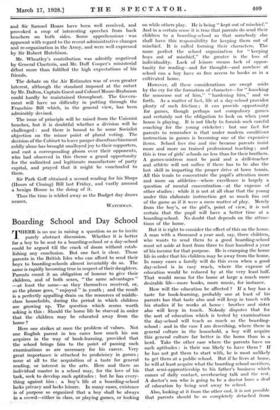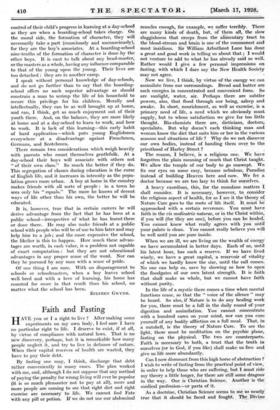Boarding School and Day School
THERE is no use in raising a question so as to invite purely abstract discussion. "Whether it is better for a boy to be sent to a boarding-school or a day-school could .be argued till the crack of doom without estab- lishing any conclusion. But one fact is clear. Those parents in the British Isles who can afford to send their boys to boarding-schools almost invariably do so. The same is rapidly becoming true in respect of their daughters. Parents count it an obligation of honour to give their children, and of both sexes, "the same advantages" —at least the same—as they themselves received, or, as the phrase goes, " enjoyed " in youth ; and the result is a perfectly appalling drain on the resources of middle- class households, during the period in which children are growing up. The question which seems worth asking is this : Should the home life be starved in order that the children may be educated away from the home ?
Here one strikes at once the problem of values. Not one English parent in ten cares how much his son acquires in the way of book-learning, provided that the school brings him to the point of passing such examinations as are necessary for his career. Very great importance is attached to proficiency in games ; none at all to the acquisition of a taste for general reading, or interest in the arts. Here and there an individual master in a school may, for the love of his task, seek to develop such aptitudes : but he has every- thing against him : a boy's life at a boarding-school lacks privacy and lacks leisure. In many cases, existence is of purpose so organized that a boy shall be always in a crowd—either in class, or playing games, or looking on while others play. He is being" kept out of mischief." And in a certain sense it is true that parents do send their children to a boarding-school so that somebody else shall have this responsibility for keeping them out of mischief. It is called forming their characters. The more perfect the school organization for "keeping boys out of mischief," the greater is the loss of individuality. Lack of leisure means lack of oppor- tunity for reading—and for thought—and nowhere at school can a boy have so free access to books as in a cultivated home.
However, all these considerations are swept aside by the cry for the formation of character—for " knocking the nonsense out of him," "hardening him," and so forth. As a matter of fact, life at a day-school provides plenty of such friction ; it can provide opportunity for games, though perhaps not compulsory games and certainly not the obligation to look on when your house is playing. It is not likely to furnish such careful coaching for the young cricketer : but one fact for parents to remember is that Under modern conditions instruction in games is becoming one of the expensive items. School fees rise and rise because parents insist more and more on trained professional teaching ; and this is true of girls' schools no less than for their brothers. A games-mistress must be paid and a drill-teacher and athlete will not suffice if there has to be also the last skill in imparting the proper drive at lawn tennis. All this tends to concentrate the pupil's attention more and more on athletics—where excellence is largely a question of mental concentration—it the expense of other studies: while it is not at all Clear that the young under this elaborate instruction get so much fun out of the game as if it were a mere matter of play. Merely from the boy's, or the girl's, point of view, it is not certain that the pupil will have a better time at a boarding-school. No doubt that depends on the attrac- tions of the home.
But it is right to consider the effect of this on the home. A man with a thousand a year and, say, three children, who wants to send them to a good boarding-school must set aside at least from three to four hundred a year Of his income for that purpose. He is cramping the home life in order that his children may be away from the home. In many cases a family will do this even when a good day-school is in easy reach, where the expense of education would be reduced by at the very least half. That would mean for the home at large a much more desirable life—more books, more music, for instance.
How will the education be affected ? If a boy has a taste for book-learning, probably one at least of his parents has that taste also and will keep in touch with his studies if he works at home : brother and sister also will keep in touch. Nobody disputes that fox the sort of education which is tested by examinations the day-school will teach as much as the boarding- school : and in the case I am describing, where there is general culture in the household, a boy will acquire this general culture far better in the home than in a herd. Take the other case where the parents have no such aptitudes : is their son likely to have them ? If he has not got them to start with, he is most unlikely to get them at a public school. But if he lives at home, he will at least acquire what the boarding school sacrifices, that semi-apprenticeship to his father's business which comes of daily contact, overhearing talk and the rest. A doctor's son who is going to be a doctor loses a deal Of education by being sent away to school.
Also, looking at it from the other end, it is not possible that parents should be so completely detached from control of their child's progress in learning at a day-school as they are when a boarding-school takes Charge. . On the moral side, the formation of character, they will necessarily take a part (consciously and unconsciously), for they are the boy's associates. At a boarding-school nine-tenths of the formation of character is done by the ether boys. It is cant to talk about any head-master, or the masters as a whole, having any influence comparable to that of the young upon the young. Their lives are too detached : they are in another camp.
I speak without personal knowledge of day-schools, and do not go further than to say that the boarding- school offers no such superior advantage as should constrain a man to scrimp the life of his household to secure this privilege for his children. Morally and intellectually, they can be as well brought up at home, and can, I think, get as much enjoyment out of their youth there. And, on the balance, they are more likely at home and at a day-school to learn to work, and how to work. It is lack of this learning—this early habit of hard application—which puts young Englishmen everywhere at a disadvantage against Frenchmen, Germans, and Scotchmen.
There remain two considerations which weigh heavily with parents who count themselves gentlefolk. At a day-school their boys will associate with others not "of their own class." So much the better if they do. This segregation of classes during education is the curse of English life, and it increases in intensity as the popu- lation grows more urban. A boy at home in the country makes friends with all sorts of people : in a town he sees only his "equals." The more he knows of decent ways of life other than his own, the better he will be educated.
It is,- however, true that in certain careers he will derive advantage from the fact that he has been at a public school—irrespective of what he has learnt there or done there. He may also make friends at a public school with people.who will be of use to him later and may help him to a job ; and the more expensive the school, the likelier is this to- happen. How much these advan- tages are worth, in cash value, is a problem not capable of exact computation : but they are not educational advantages in any proper sense of the word. Nor can they be pursued by any man with a sense of pride.
Of one thing I am sure. With no disparagement to- schools or schoolmasters, when a boy leaves school well, bred and with a love of learning, his home has counted for more in that result than his school, no matter what the school has been.
STEPHEN GWYNN.











































 Previous page
Previous page